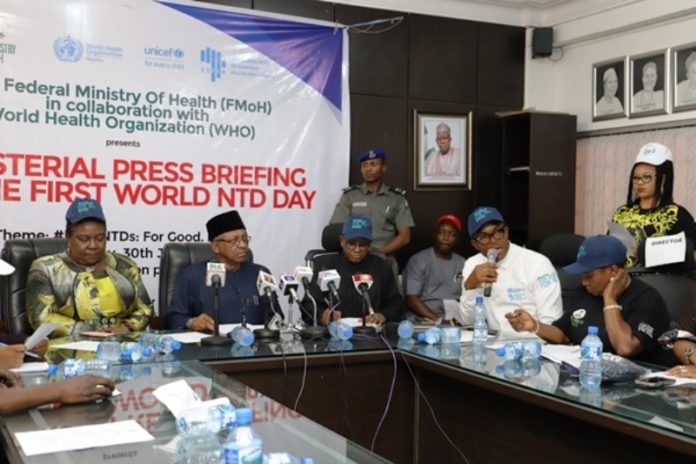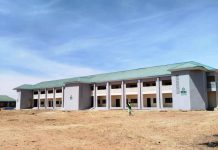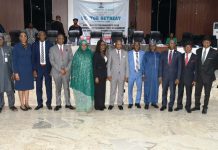Experts on Neglected Tropical Disease (NTDs) have converged in Abuja to hold the first World Neglected Tropical Disease Day in Nigeria. The aim is to review its activities, discuss progress and proffer solutions to some of the challenges in eliminating the Epidemic in Nigeria.
The Honourable Minister of Health, Dr. Osagie Ehanire made this known while briefing the Press in Abuja to commemorate the 2020 World Neglected Tropical Disease (NTDs) day with the theme: Beat NTDs, For Good: For All.
The Minister stated that NTDs are old disease that prevail in poor countries and that they have been almost totally eliminated in the developed world.
He noted that Neglected Tropical Disease are diverse group of communicable diseases that spread across tropical and sub-tropical conditions. These diseases are singled out because of their adverse impact, relative obscurity and the availability of tools to combat them.
Dr. Ehanire disclosed that people afflicted by these diseases are usually poor, vulnerable and left on their own to face the debilitating consequence of the NTDs. There are over 20 of these diseases which include blinding trachoma, buruli ulcer, guinea worm disease, endemic treponematoses. Lymphatic filariasis, onchoceraciasis and many others.
He added that ‘’Children who suffer from NTDs shy away from attending schools, grow up with no skills and are hindered in basic occupation, like farming and fishing, or any avenue of earning a living and thus trapped in a cycle of diseases and poverty.
He stated that NTDs and poverty are therefore so interlinked that fighting NTDs has direct benefit on productivity and ability of citizens to contribute to the nation’s GDP. Therefore, NTD elimination also eliminates poverty.
The Health Minister also hinted that the government and the development partners have been working assiduously to tackle the scourge of these diseases and Nigeria’s plan for action for 2013 to 2020 was supported and executed by the federal, State and local governments.‘’
The focused execution of the plan of action led to incredible successes being recorded which included the eradication of guinea worm from Nigeria, the elimination of lymphatic filariasis (elephantiasis) in Plateau and Nasarawa states, elimination of onchocerciasis (river blindness) from Kaduna, Plateau and Nasarawa states and the elimination of blinding trachoma from84 local government areas of the 112 where it is endemic.
Dr Osagie maintained that ‘’With the dawn of a new decade we shall continue to strengthen our health system and pursue opportunities for mainstreaming NTD control within several programs of the Ministry of Health geared towards providing Universal health coverage for its citizenry”
He highlighted that the 2013 -2020 master plan will be evaluated to ensure seamless continuation to a 2021-2026 plan in order to sustain the gains made so far’’.
The Permanent Secretary, Health, Mr Abdulaziz Mashi Abdullahi, stated that statistics showed that globally, NTDs caused the loss of up to 534,000 lives and 57 million disability-adjusted life years daily’s each year while about 100 million persons in Nigerians are at the risk of one or more of these neglected tropical disease (NTDs).
He added that the commitment to beat Neglected Tropical Disease (NTDs) is both ambitious and realistic, and it is in line with the National Health Policy (Section 4.1.2.); and the second National Strategic Health Development Plan (Section 5.30); World Health Assembly (WHA), Resolution 66.12; as well as Sustainable Development Goals (SDG 3.3).
Mr Abudullalhi noted that the World NTDs Day has presented Nigeria a golden opportunity to scale up awareness in order to make the campaign against NTDs a priority thus ending the chronic neglect associated with NTDs.
The Officer in charge of the World Health Organisation (WHO) Nigeria, Dr. Clement Peter, explained that although treatments for NTDs are accessible, Nigerians must make sure everyone affected by the disease get treatment im order to eradicate the disease.
Enefaa Bob-Manuel
Head (Media & Public Relations)






